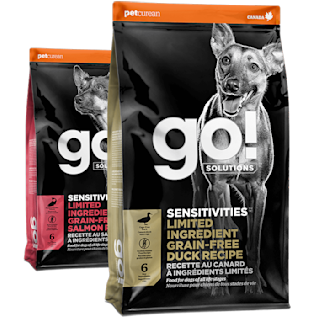June 3, 2024
Dog Food Allergy Symptoms & Adverse Food Reactions

Facing the discomfort of adverse food reactions in dogs can feel like a daunting journey for any pet parent. Knowing that your furry best friend is reacting to certain ingredients in their diet can stir up feelings of concern and confusion.
Adverse food reactions occur when the body reacts inappropriately to a component in a food. The term "adverse food reaction" encompasses both dog food allergies and food intolerances. Food allergies occur when the immune system reacts inappropriately to a food. Food intolerances are more common in dogs and cats than anaphylactic food allergies.
Most food allergens are proteins, but many components can trigger an adverse food reaction, so identifying the offending ingredient can be very challenging.
Fortunately, true food allergies are rare and the more common food sensitivities are generally less severe, hallmarked by digestive upset, recurring ear infections, and hotspots. Often dietary management or other treatments are recommended by your vet. Identifying problem ingredients or allergens is the first step to finding an appropriate diet for managing dog’s food sensitivities.
Common Dog Food Allergens
An allergen is a substance that produces a reaction, this is true for both dog food allergies and sensitivities. Some of the most common allergens found in dog food that can trigger a reaction in dogs include:
Beef - One of the most common food allergens for dogs. Many dogs experience a sensitivity to beef protein1.
Dairy - Like humans, dogs can be lactose intolerant1. They can be sensitive to dairy ingredients like milk, cheese, yogurt and whey.
Chicken - After beef, chicken is the next most common protein source to cause a reaction in dogs1.
Wheat - Wheat and wheat gluten are considered common dog food allergens1.
Corn - Corn is an ingredient in many less premium dog foods. Allergies to corn ingredients are less common1.
Soy - Soy is sometimes used as an additional protein source in dog foods. Dogs may be allergic to soybean, soymeal, or other soy derivatives1.
Dog Food Allergy Symptoms and Adverse Food Reactions
The symptoms of food sensitivities and intolerances can vary and if left untreated, the adverse food reaction may progress to a true food allergy and potentially the development of irritable bowel disease.
Some common symptoms of adverse food reactions include:
Itchy skin - This is one of the most common symptoms of food allergies in dogs1. Dogs with food intolerances often excessively lick, bite, or scratch at their skin, leading to hair loss, redness, and sores. The itching and irritation is usually focused on the face, ears, paws, armpits, and groin area.
Gastrointestinal issues - Food sensitivities can also cause vomiting, diarrhea, and other gastrointestinal problems in dogs1.
Ear infections - Dogs with food intolerances can be prone to chronic or recurrent ear infections1. The sensitivities can lead to inflammation and increased yeast levels in the ears. Signs include head shaking, scratching at ears, and bad odor.
Skin infections - The excessive scratching and licking from food intolerances can allow bacteria and yeast to infect the skin, leading to secondary infections. Dogs may develop pyoderma3, a common bacterial skin infection.
Hair loss - The intense itching and licking from allergies can cause hair loss and bald patches, especially on the legs and belly.
Hot spots - Also called acute moist dermatitis, hot spots are red, oozing, infected lesions that can be caused by a food sensitivity2. They can develop from the dog constantly licking and scratching.
Paying attention to the timing of when symptoms appear like itchy skin, ear infections, and gastrointestinal issues can help identify if a dog is experiencing an adverse food reaction rather than environmental or other allergies.
Diagnosing Dog Food Sensitivities
Determining if a dog has a food intolerance can be challenging, as the symptoms often mimic other conditions like flea allergies or atopic dermatitis. However, there are a few ways vets can diagnose food sensitivities in dogs:
Elimination Diet
An elimination diet is the gold standard for diagnosing adverse food reactions in dogs. This often involves feeding the dog a limited ingredient diet featuring a novel protein. The diet should contain a protein they have never eaten before, such as kangaroo, duck, or venison. All table scraps, flavored medications, chews, and treats are also eliminated. If the dog's symptoms dramatically improve after 10 weeks on the elimination diet, it confirms a food intolerance.
Blood Tests
Blood tests look for the presence of allergen-specific antibodies produced by the immune system. However, these results can often produce false positives. Blood tests are more useful for ruling out other causes of symptoms.
Skin Tests
Skin tests are considered the second-best diagnostic tool after elimination diets. They involve injecting suspected allergens like beef, dairy, or wheat into the dog's skin and looking for a reaction. However, skin testing for food allergies is still being perfected and has some limitations.
While diagnosing food sensitivities in dogs can be tricky, an elimination diet trial lasting at least 10 weeks (about 2 months) is the most definitive way to identify the problem. Working closely with your vet and monitoring your dog's response to dietary changes is key.
What to Feed a Dog with Food Sensitivities
The most common treatment for dog food intolerances is switching to a novel protein or limited ingredient diet designed for dogs with food sensitivities. This involves feeding your dog a novel protein and carbohydrate source that your dog has never eaten before.
Some novel protein options include:
- Venison
- Wild Boar
- Insect
- Duck
The most important thing is to completely eliminate any triggering ingredients from your dog's diet. It may take 8-12 weeks on the new diet to see improvement as your dog's body detoxes. Work closely with your vet to find a hypoallergenic diet and treatment plan for your individual dog.

Recommended Solution
Expertly crafted limited ingredient dog food
If your dog has food allergies or intolerances, feeding a premium-quality dog food may be the solution. Go! Sensitivities is the ideal dog food for sensitive stomachs, with a single animal protein source and limited ingredients.
Sensitivities dog food
Conclusion
Dog food allergies and intolerances can be challenging for both dogs and their owners to deal with. Symptoms of food sensitivities in dogs include itchy skin, ear infections, vomiting, and diarrhea. To diagnose a dog food allergy or intolerance, vets recommend an elimination diet trial.
The best treatment is to identify and avoid the ingredients triggering reactions. Look for limited ingredient dog foods with novel protein sources like venison or duck. Avoid common allergens like chicken, beef, dairy, and wheat.
With the right diet, dogs with food allergies and sensitivities can find relief from their symptoms and live happy, healthy lives.
"Cutaneous Food Allergy in Animals." Merck Veterinary Manual. Accessed May 13, 2024. https://www.merckvetmanual.com/integumentary-system/food-allergy/cutaneous-food-allergy-in-animals.
"Hot Spots in Dogs." VCA Hospitals. Accessed May 13, 2024. https://vcacanada.com/know-your-pet/hot-spots-in-dogs.
"Pyoderma in Dogs." Merck Veterinary Manual. Accessed May 13, 2024. https://www.merckvetmanual.com/dog-owners/skin-disorders-of-dogs/pyoderma-in-dogs.



